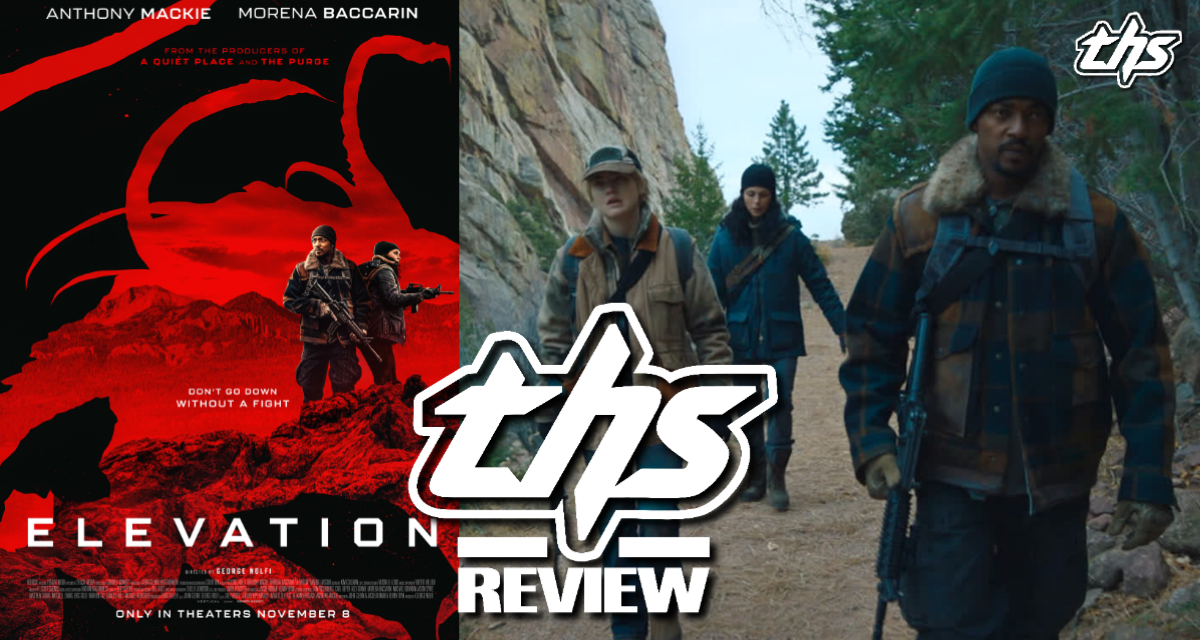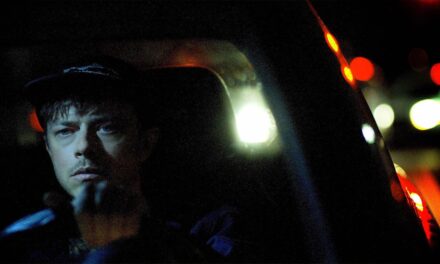A good parent will do anything for the welfare of their children. Nowhere is that more true than in George Nolfi’s Elevation, where a father has to travel from a safe haven into indestructible-beast-ruled territory to save his son’s life. It’s a gorgeously shot film with well designed creatures, and anchored by notable performances. Still, it feels inescapably familiar in both concept and execution, and doesn’t quite escape the shadow of so many apocalyptic monster movies before it.
Elevation follows Will (Anthony Mackie), a dedicated father in apocalyptic circumstances where 95% of the human population has been exterminated by a species of massive insectoids. The creatures hunt the planet’s apex predators, humans, but curiously never eat them. This makes the monsters nonstop killing machines that easily eviscerate human defenses thanks to an electromagnetic field that renders them bulletproof. Weirdly, the beings never travel above 8,000 ft in elevation, so the remaining human survivors live in mountainous zones. When Will’s adopted son, Hunter (Danny Boyd Jr.) needs new medical equipment, Will has to travel below the line of safety. He’s accompanied by a scientist with a tragic connection to his wife, scientist Nina (Morena Baccarin), alongside his wife’s best friend Katie (Maddie Hasson). The team try and save Hunter’s life while Nina has a secret simultaneous objective: finding a weakness in the monster’s defenses to give humanity a fighting chance.
Post-apocalyptic monster movies are an increasingly saturated genre. Bird Box provides a mysterious showcase of creatures driving humanity to the brink of extinction via insanity or suicide, while Arcadian follows Nicolas Cage as a father raising two sons following an entirely different monster apocalypse. Perhaps the biggest cinematic footprint is that of the A Quiet Place franchise, whose main storyline follows a family surviving in a rural area after bulletproof, extremely violent creatures who destroy anything that makes a sound arrive from the stars. The first begins with a family tragedy as the family goes into the city for a supply run, sharing a number of traits with Elevation.

The basic premise isn’t novel enough to elevate Elevation on its own. It certainly calls attention to the various films that came before, A Quiet Place in particular given the need to escape bulletproof, quickly hunting beasts that seem too busy with extreme violence to eat. Also naggingly familiar is the search for the weakness to their impenetrability being a key plot point. The design of the bug-like beasts (they appear like massive, armored grasshopper-esque entities) is engaging, however, as is their mysterious limitation with regard to elevation. That the creatures never attack above 8,000 feet is left for another film to explain (characters literally inquire about it in dialogue, leaving it to a resounding shrug), bringing an air of mystery but limiting how novel it can truly feel in this entry.
Mackie (also producer) is great as Will, looking after his situationally adoptive son despite the trauma of the loss of his wife. He lands the film’s intense action and emotional complexity, and shares real on-screen chemistry with both Hasson and Baccarin. The latter, as the frequently drunk and prickly Nina who longs for vengeance against the beasts, adeptly shifts away from the charisma she displays in roles like Deadpool’s Vanessa or Firefly’s Inara for a very different but multifaceted role. It’s a strong turn, and despite the film mostly following isolated characters left alone in the world, these three characters play off each other well and are able to carry the film.

Perhaps the best thing about Elevation is its successful commitment to scale. The benefit of the scenic mountains isn’t because of its direct narrative ties per se, but rather that it provides opportunity for notable vistas while successfully using them to evoke strong feelings of isolation. Shelly Johnson’s intelligent cinematography takes full advantage of the brightness of daylight and the colors it attends, a far cry from the drabness that accompanies so many post-apocalyptic entries. While there are moments of darkness and claustrophobic tightness, much of the film also takes place in open spaces. This welcome choice is well used to allow for exciting set pieces and to give a sense of scale and the power of these creatures, descending on the protagonists with alarming power reminiscent of the baddest of Elden Ring’s baddies. It finds tension and horror in these creatures’ daylight dominance, echoing Bong Joon-ho’s excellent strategy in The Host over the Jaws-esque adage that one never sees the creature (born of practicality in 1975 before being eternalized in so many subsequent features).
Altogether, Elevation is a highly watchable and elegantly simple creature feature. The creatures look good, the cast anchors it well, and there’s clearly much more to the world than we see in this iteration… no doubt there’s a planned sequel in tow. The biggest weakness is that, given that details that would showcase its uniqueness are held in reserve, it reads far too bluntly like so many films that have gone before without sufficient novelty to elevate the material. It’s still worth watching because of the gorgeous use of scale, color, and light to reveal the monsters’ danger and dominance–watch it on the biggest screen possible, given how rare it is these days for a film to properly use scale. Ultimately, Elevation is a good (and beautiful) film that’s a few surprises away from being a great one.
Elevation opens nationwide on November 8, 2024.



![‘Spy x Family’ Ch. 77: Mr. Austin Vs. PTSD? [Manga Review]](https://www.thathashtagshow.com/wp-content/uploads/2023/03/336660825_632638185368385_8815496602043484170_n-440x264.jpg)

![M3GAN Your New Best Friend [Trailer]](https://www.thathashtagshow.com/wp-content/uploads/2022/10/M3G_Tsr1Sheet20_RGB_2-440x264.jpeg)